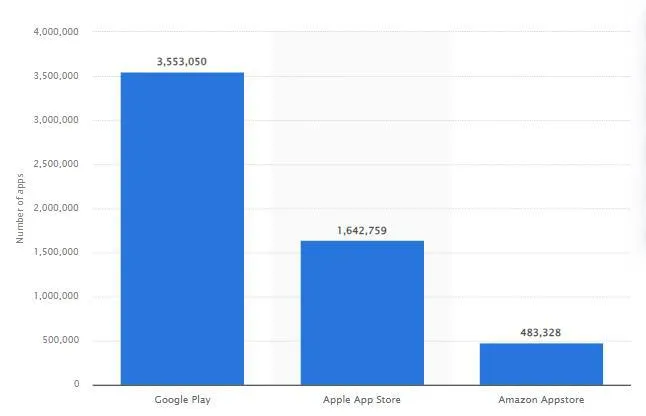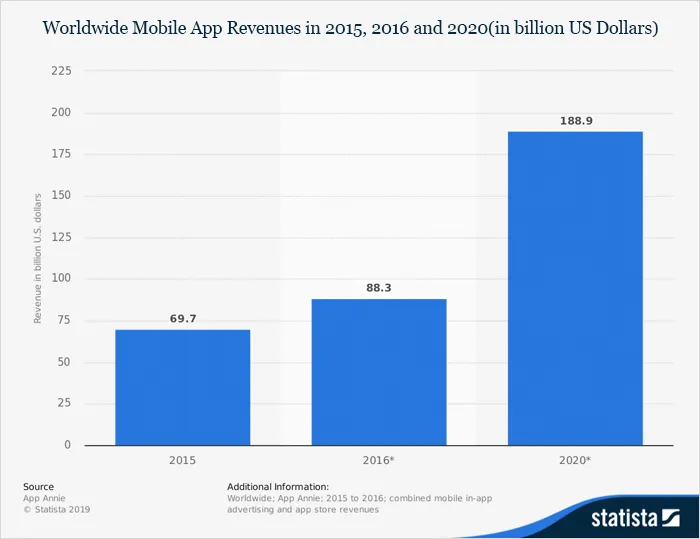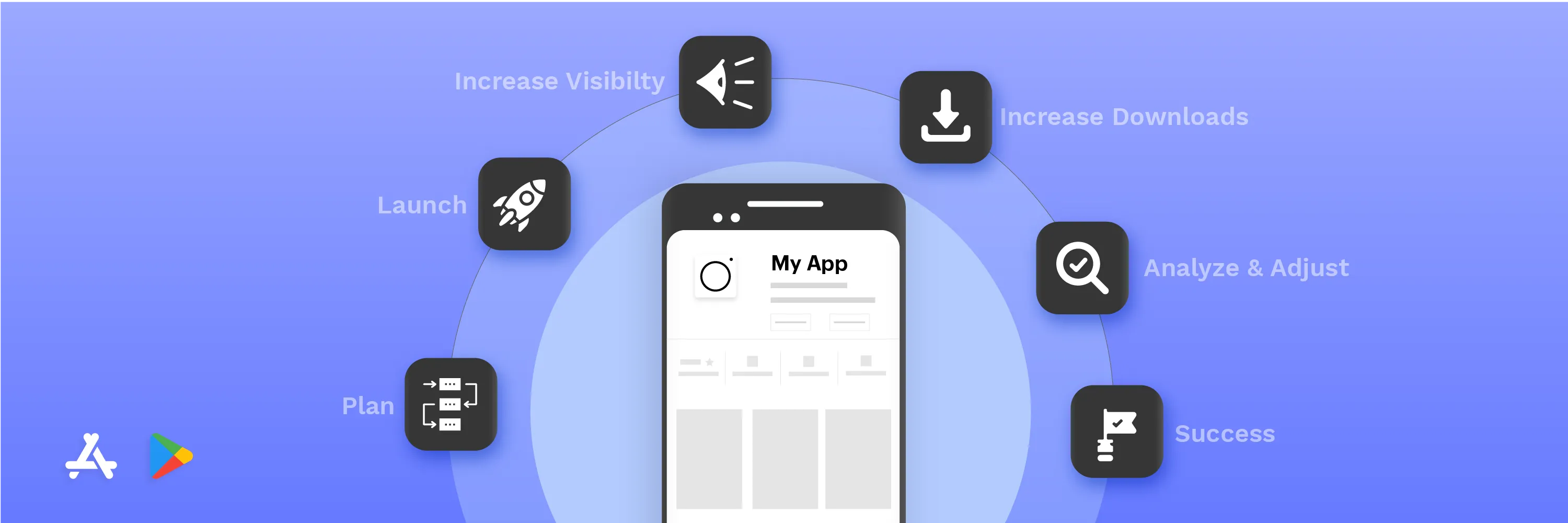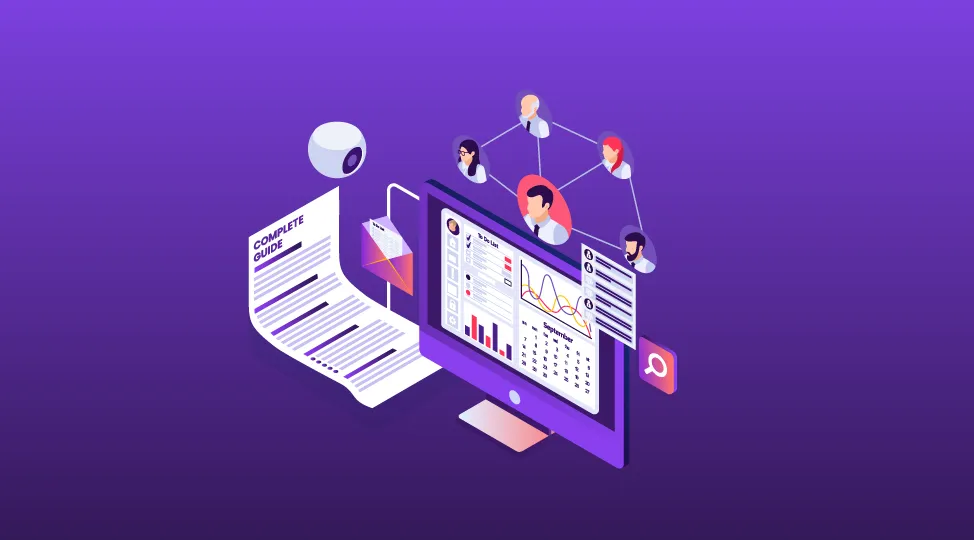In the ever-evolving digital landscape, keeping up with the latest trends and strategies is vital for the success of your mobile application. As we enter 2025, App Store Optimization (ASO) continues to play a pivotal role in increasing your app's visibility and downloads. In this comprehensive guide, we'll delve into the nitty-gritty of ASO, providing you with expert insights and actionable tips to outperform your competition in the app stores.
If you are a company or organization wondering how to dive into the mobile app market and climb up high in the user's choice, App Store Optimization (ASO) is the way to go! Have a look at the attached image below.

What is ASO and Why Does it Matter?
Defining App Store Optimization
App or Application Store Optimization, often abbreviated ASO, enhances your mobile application's visibility within app stores like Apple's App Store and Google Play Store. It involves optimizing various elements, such as your app's title, description, keywords, and visual assets, to boost its ranking in search results.
The Significance of ASO
In a world where millions of apps are vying for users' attention, ASO is the secret sauce that can set your app apart. It increases the chances of discovering your app and enhances its credibility, resulting in more downloads, higher user engagement, and increased revenue.
The market is experiencing a nearly three times growth in worldwide revenue and is expected to earn more for the next few decades at least. This is one of the main reasons companies are shifting to the mobile applications market more than ever. Instead of overspending on paid acquisition tools like CPI networks, Social Media and App Search Ads, PPC, and more, earning organic customers through app store optimization strategies is more profitable.

The Key Components of App Store Optimization
App Title
The app title is the name of your mobile application. It should be concise, catchy, and contain relevant keywords to improve your app's visibility in app store search results.
Keyword Research
Keyword research involves identifying and selecting relevant keywords and phrases that users are likely to use when searching for apps similar to yours. These keywords are essential for optimizing your app's visibility.
App Description
The description is a text-based overview of your app's features, benefits, and functionalities. It should be well-written informative, and incorporate your target keywords to attract potential users.
App Icon
The app icon is the visual representation of your app. It should be visually appealing, reflect your app's core functionality, and stand out among other icons to entice users to click and explore your app.
Screenshots and Video Previews
Visual elements, such as screenshots and video previews, give users a glimpse of your app's user interface and features. They are essential for showcasing what your app offers and can persuade users to download it.
App Ratings and Reviews
App ratings and reviews reflect users' opinions and experiences with your app. Positive ratings and reviews can enhance your app's credibility and influence potential users. Encouraging satisfied users to leave positive feedback and address any negative reviews is crucial.
Category and Genre Selection
Choosing the right app category and genre is important for categorizing your app correctly. It ensures that your app is visible to users interested in similar types of applications.
App Size and Compatibility
Information about your app's size and compatibility helps users determine if it suits their devices. This transparency can increase downloads from users with compatible devices.
Release Notes
Regularly updating your app and providing detailed release notes is essential for keeping users engaged. It demonstrates that you're actively improving the app and fixing issues, which can positively impact your app's ranking.
Localization
Localization involves adapting your app to different regions and languages. This can include translating the app's content and using region-specific keywords to expand your app's reach to a global audience.
These components collectively contribute to the success of your ASO strategy, helping you optimize your app's visibility and increase its downloads in app stores.
Explore More- Mobile App Marketing Strategies That Work
Best Practices- App Store Optimization in 2025
Application Store Optimization (ASO) is a crucial aspect of ensuring the visibility and success of your mobile application in app stores like the Apple App Store and Google Play Store. To help you understand ASO best practices in detail, let's explore each practice:-
Keyword Research
- Keyword research involves identifying and selecting relevant keywords and phrases that potential users will likely use when searching for apps like yours.
- In-depth keyword research is essential. Consider the terms and phrases that accurately describe your app's features and functionalities. Tools like Google Keyword Planner and specialized ASO tools can help identify high-traffic keywords with low competition.
App Title
- The app title is the official name of your application. It should be catchy and concise while incorporating your primary target keywords.
- Your app's title is one of the most critical elements for ASO. It should be memorable and reflect the core purpose of your app. Including relevant keywords in the title can significantly impact your app's discoverability in search results.
App Description
- The app description is a text-based overview of your app's features, benefits, and functionalities. It should provide users with a clear understanding of what your app offers.
- A well-written app description is crucial. Use this space to elaborate on your app's unique selling points and the problems it solves. Integrate relevant keywords naturally to improve your app's search ranking.
App Icon
- The app icon is the visual representation of your application. It is the first thing users see, and it should be visually appealing and reflect your app's core functionality.
- Design an eye-catching and memorable app icon that distinguishes your app from the competition. A compelling icon can increase click-through rates and drive user interest.
Screenshots and Video Previews
- Screenshots and video previews showcase your app's user interface and features, giving potential users a visual idea of what to expect.
- Use this space to highlight your app's most enticing and unique aspects. Demonstrate how users will benefit from your application through screenshots and videos.
App Ratings and Reviews
- App ratings and reviews reflect user opinions and experiences with your app. Positive reviews and high ratings enhance your app's credibility.
- Encourage satisfied users to leave positive reviews and high ratings. Address any negative feedback professionally and promptly. Positive reviews and ratings directly impact your app's conversion rate.
App Updates
- Regularly updating your app with new features, improvements, and bug fixes is crucial for maintaining user engagement and demonstrating your commitment to providing an excellent user experience.
- Frequent updates keep your app relevant and signal to app stores that your app is actively maintained, which can positively impact your app's search ranking.
Localization
- Localization involves adapting your app to different regions and languages, making it more accessible to a global audience.
- Translate your app's content into multiple languages and use region-specific keywords. This approach can open new markets and significantly increase your app's reach.
A/B Testing
- A/B testing involves experimenting with different elements of your app store listing, such as the app icon, screenshots, and description, to identify which variations perform better.
- Conduct A/B tests to fine-tune your App Store optimization strategy. You can optimize your app's conversion rate and overall performance by testing different visuals and descriptions.
Monitoring Competitors
- Keeping an eye on your competitors and analyzing their strategies can provide valuable insights into what works in your industry.
- Monitor the app listings of competitors in your niche. Observe which keywords they target, the quality of their visuals, and their user engagement strategies. This information can help you refine your own ASO efforts and stay competitive.
By implementing these ASO best practices, you can significantly improve your app's visibility, attract more users, and ultimately achieve your app's goals in the highly competitive world of mobile applications.
How Is App Store Optimization Beneficial for App's Success?
App Store Optimization (ASO) is a fundamental component in ensuring the success of a mobile application. It offers myriad benefits that directly impact an app's visibility, credibility, and, ultimately, its overall success. Here's a detailed explanation of how ASO contributes to an app's triumph:
(1.) Increased Visibility
ASO enhances an app's visibility in app stores. By optimizing elements like the app title, description, and keywords, your app is more likely to appear in the top search results when users look for relevant apps. Increased visibility means more potential users discovering your app.
(2.) Higher Search Ranking
A well-executed ASO strategy can boost your app's ranking in search results. When your app appears higher in search rankings, it's more likely to be noticed and downloaded by users. ASO enables your app to outrank competitors and increase organic traffic.
(3.) Improved User Engagement
A key component of ASO is creating compelling visuals and descriptions that accurately represent your app's features and benefits. Users who see a clear and enticing app listing are likelier to engage with your app, resulting in increased downloads and user interaction.
(4.) Quality User Acquisition
ASO helps attract users who are genuinely interested in your app's functionality. By optimizing your keywords and descriptions, you are more likely to draw in users who are actively searching for the services or features your app provides. This targeted user acquisition leads to higher-quality downloads.
(5.) Enhanced Credibility
Positive ratings and reviews, a part of ASO, boost your app's credibility. Potential users who see a high rating and read positive reviews are more inclined to trust and download your app. Credibility plays a crucial role in attracting and retaining users.
(6.) Increased Conversions
The optimization of visual assets, such as app icons, screenshots, and video previews, leads to better conversion rates. Users are likelier to click on your app and explore it further if visually appealing and informative assets entice them. This, in turn, increases the chances of downloads.
(7.) User Retention
Regularly updating your app, as recommended by ASO best practices, demonstrates your commitment to providing a positive user experience. Happy users are more likely to stay engaged with your app and recommend it to others.
(8.) Global Reach
Localization, a part of ASO, allows you to adapt your app for different languages and regions. This enables your app to reach a global audience and access new markets, increasing your app's success on a global scale.
(9.) Competitive Edge
You can gain a competitive edge in the app marketplace by staying updated with ASO trends and monitoring your competitors. You can adjust your strategy in response to changing trends and outperform rival apps in the same niche.
(10.) Monetization Opportunities
Successful ASO leads to more downloads and user engagement. This, in turn, provides you with opportunities for monetization, such as in-app purchases, subscriptions, or advertising revenue, contributing to the financial success of your app.
ASO is not just a nice-to-have but a must-have strategy for any app developer or publisher. It significantly impacts an app's success by increasing visibility, attracting the right users, and improving user engagement and credibility. Following ASO best practices, you can optimize your app's performance and unlock its full potential in the competitive app marketplace.
Conclusion
App Store Optimization is not just a buzzword; it's critical to ensuring your app's success in a highly competitive market. By following the best practices outlined in this guide and adapting to the ever-changing landscape of the app stores, you can maximize your app's visibility and achieve your goals. Remember, ASO is a dynamic process that requires ongoing attention and adaptation.
Frequently Asked Questions-
What are the best practices for writing a compelling app description?
A good app description should be concise, highlight the app's unique features, and include relevant keywords.
How can I optimize my app's visual assets, such as icons and screenshots?
Use high-quality images, showcase the app's main features, and provide context through captions or overlaid text.
How frequently should I update my app to improve ASO?
Regular updates can positively impact ASO. Aim to fix bugs, enhance features, and respond to user feedback promptly.
What is the role of app localization in ASO?
Localizing your app for different regions and languages can significantly boost your app's visibility and appeal to a broader audience.
How can I monitor the success of my ASO efforts?
Use ASO tools to track your app's rankings, download numbers, and user reviews. Analyze this data to make informed adjustments to your strategy.
What are some common mistakes to avoid in ASO?
Common mistakes include keyword stuffing, using irrelevant keywords, neglecting user reviews, and not optimizing visual assets effectively.
Do the rules of ASO differ between the Apple App Store and Google Play Store?
Yes, these two major app stores have some differences in ASO strategies. For instance, the character limits for app titles and descriptions are different.
Tags
App Marketing
ASO Marketing
App Store optimization



 Facebook
Facebook
 Twitter
Twitter
 LinkedIn
LinkedIn
 Pinterest
Pinterest







